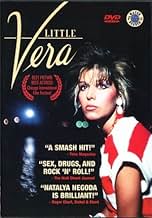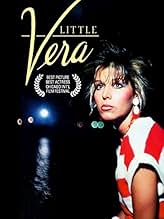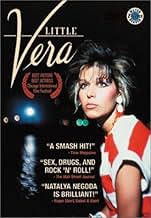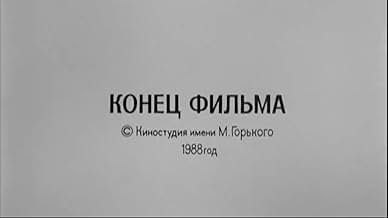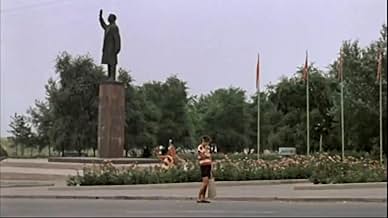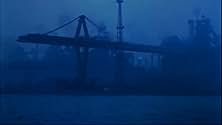VALUTAZIONE IMDb
6,9/10
2283
LA TUA VALUTAZIONE
Aggiungi una trama nella tua linguaA teenage girl, who has just finished school feels trapped and aimless in her ordinary Russian family, supported by an alcoholic father, in a dull industrial town.A teenage girl, who has just finished school feels trapped and aimless in her ordinary Russian family, supported by an alcoholic father, in a dull industrial town.A teenage girl, who has just finished school feels trapped and aimless in her ordinary Russian family, supported by an alcoholic father, in a dull industrial town.
- Regia
- Sceneggiatura
- Star
- Premi
- 7 vittorie e 9 candidature totali
Aleksandr Negreba
- Viktor - brat Very
- (as Alexander Alexseyev Negreba)
Aleksandra Tabakova
- Lenka Chistyakova
- (as Alexandra Tabakova)
Gennady Goryachev
- Sledovatel
- (as G. Goryachev)
Vadim Zakharchenko
- Muzhchina v bolnichnoy palate
- (as V. Zakharchenko)
Mariya Khmelik
- podruga Viktora
- (as M. Khmelik)
Maksim Nayrabe
- brat Lenki Chistyakovoy
- (as Maxim Nairabe)
Recensioni in evidenza
One of the major aspects of "Malenkaya Vera" (called "Little Vera" in English) is that it was the first movie from the Soviet Union that featured a sex scene, albeit a short one. The title is important: Vera is the Russian word for "faith", identifying that punk Vera (Natalya Negoda) has little faith in the Soviet system. And as the movie shows, there's not much faith to be had in it. The opening scene shows the bleak industrial town of Zhdanov, nearly a hell on earth. When Vera's lover Sergei (Andrey Sokolov) moves in with her family, it leads to some unexpected events.
Like in many Russian movies, people's names describe their characters. For example, there's Viktor (remember that "victor" means winner). All in all, this is a good look at the Soviet Union while it was collapsing - and we can see why it was collapsing. Really good.
Like in many Russian movies, people's names describe their characters. For example, there's Viktor (remember that "victor" means winner). All in all, this is a good look at the Soviet Union while it was collapsing - and we can see why it was collapsing. Really good.
10fred3f
It is difficult, today and in the US, to understand this movie. We have nothing, really, to compare it with. Here is an attempt at comparison: It is as if during the last years of Saddam's rule, a filmmaker in Iraq were somehow able to make a film, which, for the first time ever, showed life as it really was lived in that country. The life of ordinary young girl, with all the terror and the repression full blown. Then the film was exhibited freely in Iraq. If you could imagine that unlikely event, then you might have an idea of what went on with this film in the last few years of the Soviet Union. Prior to this film, Soviet cinema was highly censored. Soviet movies would only show an ideal life in the worker's paradise. Then suddenly this. The alcoholism, the random sex, the ugly wasteland that was the Soviet city, the choking pollution, the proletariat victimizing each other and themselves, the utter hopelessness - it is all there. People were stunned. Soviet women would often weep during the showings. Many would say that this is the story of their lives. It was a cultural earthquake the like of which filmmakers only dream of accomplishing. It undoubtedly hastened the breakup of the Soviet Union.
Reading the reviews here, I can see that few understand this film. One says it was groundbreaking because it contained real sex. To the Soviet viewers at the time, the sex was a minor event compared to fact that it portrayed reality for the first time in Soviet cinema.
Others compare it to current films such as "As Good as it Gets" Might as well compare Homer's Illiad to the latest John Grissam novel. They simply do not compare. This is not just a film, this is was a social document, and a transforming social force. It needs to be viewed that way or you will not understand the film.
Other reviewers see it as a film about a dysfunctional Russian family. One even says that it is difficult to feel sorry for Vera because she keeps coming back to her family. The point is that Vera and her family are symbols for all of Soviet life. There was nowhere else to go, because the family down the block and in the next town were the same. This was life in the Soviet Union for most people.
This is a film that can be viewed on many levels: as a drama it traces the landscape of despair, as a social document it shows the living conditions of the time, as a political document it shows the attitude of the people and many of the reasons for the break-up of the Soviet Union, and as a moral document it shows the evils of a dictatorship that is out of control, and the cruelties that victims will practice on each other.
Little Vera clearly shows the human toll that Socialism eventually takes on its victims, despite any good intentions that system may have. In doing so it helped end the Soviet regime thus contributing to one of the major changes in modern history. This film achieves what only a few films have ever accomplished. It is not only an stunning representation of history but it also become a force in that shaped history.
Reading the reviews here, I can see that few understand this film. One says it was groundbreaking because it contained real sex. To the Soviet viewers at the time, the sex was a minor event compared to fact that it portrayed reality for the first time in Soviet cinema.
Others compare it to current films such as "As Good as it Gets" Might as well compare Homer's Illiad to the latest John Grissam novel. They simply do not compare. This is not just a film, this is was a social document, and a transforming social force. It needs to be viewed that way or you will not understand the film.
Other reviewers see it as a film about a dysfunctional Russian family. One even says that it is difficult to feel sorry for Vera because she keeps coming back to her family. The point is that Vera and her family are symbols for all of Soviet life. There was nowhere else to go, because the family down the block and in the next town were the same. This was life in the Soviet Union for most people.
This is a film that can be viewed on many levels: as a drama it traces the landscape of despair, as a social document it shows the living conditions of the time, as a political document it shows the attitude of the people and many of the reasons for the break-up of the Soviet Union, and as a moral document it shows the evils of a dictatorship that is out of control, and the cruelties that victims will practice on each other.
Little Vera clearly shows the human toll that Socialism eventually takes on its victims, despite any good intentions that system may have. In doing so it helped end the Soviet regime thus contributing to one of the major changes in modern history. This film achieves what only a few films have ever accomplished. It is not only an stunning representation of history but it also become a force in that shaped history.
Little Vera is the story of a Russian teenager, her family, and her attempts to find meaning and value in a life sliding increasingly into decay. In her search for meaning, she falls in love with a more intellectual and rebellious Sergei, whose hatred for her deeply flawed parents quickly spirals out of control.
Little Vera is shocking and disturbing in nearly every way. The drinking of the father, the enabling and lack of understanding of the mother, the casual lies and misdirection of the brother, and Vera herself forgiving them all their flaws are all shocking and slightly disturbing to watch. However, the raw honesty of the film somehow manages to become even more shocking than the plot or characters. Set in cramped spaces and vast urban decay, Little Vera presented a vastly different view of Soviet life than had ever been seen before. In fact, Little Vera is a portrait of the collapse of Soviet society painted in shades of pain, desperation, and rust. It is the implosion of a family set against the implosion of an entire social order.
Although painful and desperately unsatisfying, the film itself is definitely worth seeing, if only to understand the feelings and cultures still reshaping Russia today.
Little Vera is shocking and disturbing in nearly every way. The drinking of the father, the enabling and lack of understanding of the mother, the casual lies and misdirection of the brother, and Vera herself forgiving them all their flaws are all shocking and slightly disturbing to watch. However, the raw honesty of the film somehow manages to become even more shocking than the plot or characters. Set in cramped spaces and vast urban decay, Little Vera presented a vastly different view of Soviet life than had ever been seen before. In fact, Little Vera is a portrait of the collapse of Soviet society painted in shades of pain, desperation, and rust. It is the implosion of a family set against the implosion of an entire social order.
Although painful and desperately unsatisfying, the film itself is definitely worth seeing, if only to understand the feelings and cultures still reshaping Russia today.
Forget every spy movie you've ever seen - this is what life was like in the USSR, and still is in many places in Russia and the ex-Soviet countries. Vera dreams of life of leisure, as she imagines the West to be; her reality is very different, with a bitter mother, a violent father, and the ever-present alcohol. And her prospects for the future are not much better. She finds a man and they try to patch up a life together, but he is afflicted by the same environment, both socially and physically - the scenery in this movie is brilliant, sitting comfortably in the company of post-apocalyptic movies but obviously done with no special effects; they have just walked in and shot whatever happened to be in front of the camera.
Forget your stereotyped, cold Russians of spy movies. This is the Real Deal: people are passionate, vibrant, and present in a way you'll never see in a drama from the West.
Forget your stereotyped, cold Russians of spy movies. This is the Real Deal: people are passionate, vibrant, and present in a way you'll never see in a drama from the West.
This once notorious drama (at least in its own country) was hailed as a breakthrough when first released simply for daring to show modern Soviet life without the usual State-approved propaganda halo, in all its actual anti-bureaucratic grubbiness. But watching the film on this side of the erstwhile Iron Curtain only reinforces the notion that Soviet youth culture is thirty years behind the rest of the world: despite the often oppressive details it might be just another quaint teen delinquency relic from early 1960s Hollywood, dubbed into Russian and updated with casual sex and drug abuse. In other words, it's hardly a revelation to discover that Russian kids are just as misunderstood by adults as their American role models. But while the attitudes may look dated to Western audiences, it's at least an honest attempt to portray something of the boredom and defiant posturing of youth, in a country not exactly noted for addressing its generation gap.
Lo sapevi?
- QuizThis was the first Soviet film to depict graphic sexual intercourse on screen.
- Colonne sonoreHeaven And Hell
(uncredited)
Written by Dieter Bohlen
Performed by C.C. Catch
Produced by Dieter Bohlen
[plays during playback of the video clip of the same name C. C. Catch]
I più visti
Accedi per valutare e creare un elenco di titoli salvati per ottenere consigli personalizzati
- How long is Little Vera?Powered by Alexa
Dettagli
Botteghino
- Lordo Stati Uniti e Canada
- 1.262.598 USD
- Fine settimana di apertura Stati Uniti e Canada
- 23.950 USD
- 16 apr 1989
- Lordo in tutto il mondo
- 1.262.598 USD
Contribuisci a questa pagina
Suggerisci una modifica o aggiungi i contenuti mancanti

Divario superiore
By what name was La piccola Vera (1988) officially released in India in English?
Rispondi
